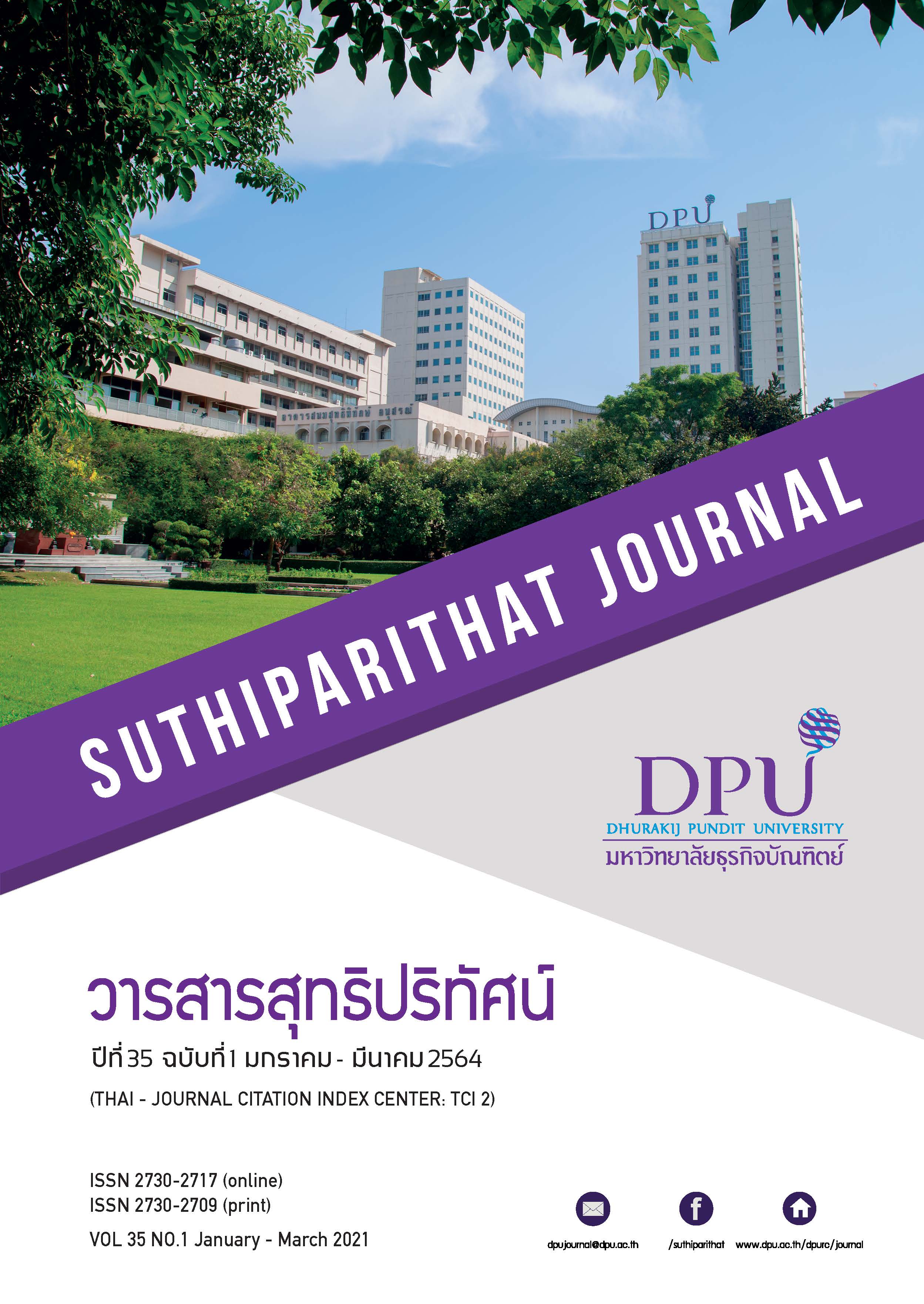วิธีวิจัยเชิงคุณภาพในงานวิจัยทางด้านภาษาอังกฤษเพื่อวัตถุประสงค์เฉพาะ: การวิเคราะห์แนวโน้ม
คำสำคัญ:
การวิเคราะห์แนวโน้ม, วิธีวิจัยเชิงคุณภาพ, งานวิจัยทางด้านภาษาอังกฤษเพื่อวัตถุประสงค์เฉพาะบทคัดย่อ
งานวิจัยนี้ศึกษาแนวโน้มของการใช้วิธีวิจัยแบบองค์รวมและการใช้วิธีวิจัยเชิงคุณภาพที่ถูกนำมาใช้ในงานวิจัยทางด้านภาษาอังกฤษเพื่อวัตถุประสงค์เฉพาะ โดยศึกษาจากงานวิจัยเชิงประจักษ์ (empirical research articles) ทั้งหมด 24 เรื่องที่ได้รับการตีพิมพ์ในวารสารภาษาอังกฤษเพื่อวัตถุประสงค์เฉพาะ (English for Specific Purposes journal) ในระหว่างปี พ.ศ. 2544 ถึง พ.ศ. 2562 การวิเคราะห์ข้อมูลแบ่งออกเป็น 2 ขั้นตอน โดยขั้นตอนแรกผู้วิจัยกำหนดช่วงเวลาตีพิมพ์เป็นสองช่วง ช่วงแรกคืองานวิจัยที่ตีพิมพ์ระหว่างปี พ.ศ. 2544 ถึง พ.ศ. 2557 และช่วงหลังคือระหว่างปี พ.ศ. 2558 ถึง พ.ศ. 2562 โดยนำเอางานวิจัยที่ตรงตามเกณฑ์ 24 ชิ้นดังกล่าวมาจัดเข้ากลุ่มตามช่วงเวลาการตีพิมพ์ เพื่อวิเคราะห์วิธีวิจัยโดยนับความถี่ จากนั้นนำมาเปรียบเทียบกัน ซึ่งพบว่ามีงานวิจัย 12 เรื่องที่ใช้วิธีเชิงคุณภาพ งานวิจัย 8 เรื่องใช้วิธีแบบผสม และงานวิจัย 4 เรื่องใช้วิธีการวิจัยเชิงปริมาณ โดยงานวิจัยเชิงคุณภาพ 5 เรื่องจาก 12 เรื่องมาจากการตีพิมพ์ช่วงหลัง ขั้นตอนที่สอง นำงานวิจัยเชิงคุณภาพ 5 เรื่องดังกล่าวมาศึกษาการใช้วิธีวิจัยเชิงลึก จากประเภทของงานวิจัยตามคำนิยามของ Creswell (2003) และ Dressen-Hammouda (2013) ผลการศึกษาพบว่าวิธีการวิจัยเชิงชาติพันธุ์วรรณา (ethnographic methods) ได้ถูกนำมาใช้อย่างแพร่หลาย และการวิเคราะห์ความต้องการ (needs analysis) ยังเป็นวิธีวิจัยที่งานวิจัยส่วนมากให้ความสำคัญอีกด้วย
เอกสารอ้างอิง
Arnó-Macià, E., & Mancho-Barés, G. (2015). The role of content and language in content and language integrated learning (CLIL) at university: Challenges and implications for ESP. English for Specific Purposes, 37, 63-73.
Banegas, D. L. (2018). Learning subject-specific content through ESP in a geography teaching programme: An action research story in Argentina. English for Specific Purposes, 50, 1-13.
Basturkmen, H. (2010). Developing courses in English for specific purposes. UK: Palgrave Macmillan.
Boonsuk, Y., & Ambele, E. A. (2019). Who ‘owns English’ in our changing world? Exploring the perception of Thai university students in Thailand. Asian Englishes, 1-12.
Chan, C. S. (2019). Long-term workplace communication needs of business professionals: Stories from Hong Kong senior executives and their implications for ESP and higher education. English for Specific Purposes, 56, 68-83.
Connor, U., & Rozycki, W. (2013). ESP and intercultural rhetoric. In B. Paltridge & S. Starfield (Eds.), The handbook of English for specific purposes (pp. 427-443). West-Sussex: Wiley- Blackwell.
Creswell, J. W. (2003). A framework for design. In J.W. Creswell (Ed.), Research design: Qualitative, quantitative, and mixed methods approaches (pp. 3–26). Thousand Oaks, CA: Sage.
Creswell, J. W. (2005). Educational research: planning conducting, and evaluating quantitative and qualitative research. Berkeley, CA USA: The Lenigh Press.
Creswell, J. W. (2013). Steps in conducting a scholarly mixed methods study [PowerPoint slides]. Retrieved from http://digitalcommons.unl.edu/cgi/viewcontent.cgi?article=1047&context=dberspeakers.
Creswell, J. W., & Creswell, J. D. (2017). Research design: Qualitative, quantitative, and mixed methods approaches. Sage publications.
Dressen-Hammouda, D. (2013). Ethnographic Approaches to ESP Research. In B. Paltridge & S. Starfield (Eds.), The handbook of English for specific purposes (pp. 501-517). West-Sussex: Wiley-Blackwell.
Dudley-Evans, T., & St John, M. J. (1998). Developments in English for specific purposes: A multi-disciplinary approach. United Kingdom: Cambridge University Press.
Fălăuş, A. (2017). The current challenges of teaching ESP. IOP Conference Series: Materials Science and Engineer, 200(1), 1-7.
Flowerdew, L. (2013). Needs analysis and curriculum development in ESP. In B. Paltridge & S. Starfield (Eds.), The handbook of English for specific purposes (pp. 325-346). West-Sussex: Wiley-Blackwell.
Gai, F. (2018). ESP course construction for transportation majors. Theory and Practice in Language Studies, 8(12), 1679-1683.
Gay, L.R. (2009). Educational research: Competencies for analysis and application. Columbus, Ohio: Prentice Hall.
Gollin-Kies, S. (2014). Methods reported in ESP research articles: A comparative survey of two leading journals. English for Specific Purposes, 36, 27-34.
Johns, A. M. (2013). The history of English for specific purposes research. In B. Paltridge & S. Starfield (Eds.), The handbook of English for specific purposes (pp. 5-30). West-Sussex: Wiley-Blackwell.
Khaldi, K. (2017). Quantitative, qualitative or mixed research: which research paradigm to use?. Journal of Educational and Social Research, 7(2), 15-24.
Knight, K., Lomperis, A. E., van Naerssen, M., & Westerfield, K. (2010). English for specific purposes. An overview for practitioners and clients [PowerPoint slides]. Retrieved from https://d1wqtxts1xzle7.cloudfront.net/36898097/1564_Knight_ESPPPTforTRC.pdf?1425817866=&response-content-disposition=inline%3B+filename%3DEnglish_for_Specific_Purposes_An_Overvie.pdf&Expires=1614772178&Signature=WRvZ1feyznwtaTMFKtdtwSdknEQxAHbv6zsE3RN6pW~hc3IdVe7Le9O27jCp~Q~ojGLtzdIkAzcuNVAZ7lhXToZTM0AOIRZ3rtCkC3RjYJbV1p8t-GvJWMdJzbzAje~yG8XP0Q2lFKQTnABQMAWcoii3uygKV15QYdOfhM~hVKEgWsCr2UbM4mO8UiCN~MzF69QbFBrcwReZrnSFxwNcBFimpV5yf77IZjDYKeIxv~zMIM97wsVlHFJP3y4PWCFdvvcswqHAuCDCnEh19Ni91HYR4ThMbdCpCTDAUno7saZcYj3-stS-pZ7XxqeWefzaE7q5k-Oo18MRVpNrQrFClQ__&Key-Pair-Id=APKAJLOHF5GGSLRBV4ZA
Lee, S. R. (2015). Research in English for specific purposes (ESP) in the 21st Century. 영어학, 15(4), 793-813.
Lu, Y. L. (2018). What do nurses say about their English language needs for patient care and their ESP coursework: The case of Taiwanese nurses. English for Specific Purposes, 50, 116-129.
Paltridge, B., & Starfield, S. (Eds.). (2013). The handbook of English for specific purposes. West-Sussex: Wiley-Blackwell.
Roshid, M. M., Webb, S., & Chowdhury, R. (2018). English as a business lingua Franca: A discursive analysis of business e-mails. International Journal of Business Communication, 1-21.
Tao, J. T., & Gao, X. A. (2018). Identity constructions of ESP teachers in a Chinese university. English for Specific Purposes, 49, 1-13.
ดาวน์โหลด
เผยแพร่แล้ว
รูปแบบการอ้างอิง
ฉบับ
ประเภทบทความ
สัญญาอนุญาต
เนื้อหาและข้อมูลในบทความที่ลงตีพิมพ์ในวารสารสุทธิปริทัศน์ ถือเป็นข้อคิดเห็นและความรับผิดชอบของผู้เขียนบทความโดยตรงซึ่งกองบรรณาธิการวารสาร ไม่จำเป็นต้องเห็นด้วย หรือร่วมรับผิดชอบใด ๆ
บทความ ข้อมูล เนื้อหา รูปภาพ ฯลฯ ที่ได้รับการตีพิมพ์ในวารสารสุทธิปริทัศน์ ถือเป็นลิขสิทธิ์ของวารสารสุทธิปริทัศน์หากบุคคลหรือหน่วยงานใดต้องการนำทั้งหมดหรือส่วนหนึ่งส่วนใดไปเผยแพร่ต่อหรือเพื่อกระทำการใด ๆ จะต้องได้รับอนุญาตเป็นลายลักษณ์อักษรจากวารสารสุทธิปริทัศน์ก่อนเท่านั้น







